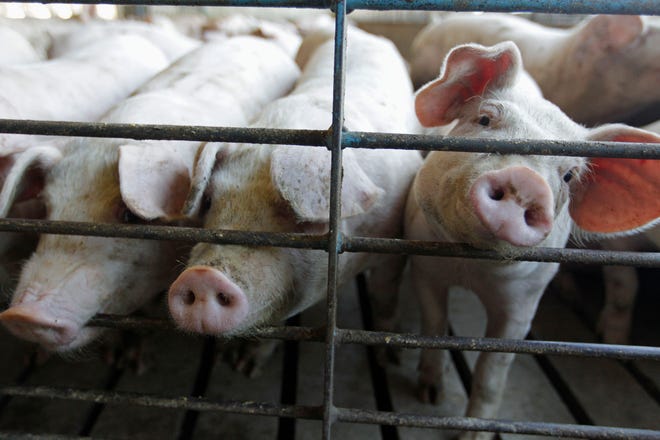New US rules to protect animal breeders expected soon
OMAHA – The Biden administration plans to issue a new rule to protect the rights of farmers who raise cows, chickens and pigs against the country’s largest meat processors as part of a plan to encourage more great competition in the agricultural sector.
The new rule that will make it easier for farmers to sue companies they contract with for unfair, discriminatory or deceptive practices is one of many measures the White House plans to announce in the coming days. The US Department of Agriculture should also tighten the definition of what it means for meat to be labeled “Product of the United States” to exclude when animals are raised in other countries and simply processed in the United States.
Farmer advocacy groups have been pushing for change for years, but Congress and the meat processing industry have resisted. A USDA official familiar with the White House plan said an executive order is expected to be announced this week that will pave the way for the new rules.
White House press secretary Jen Psaki said on Tuesday the rules are designed to “increase competition in agricultural industries to increase incomes for farmers and ranchers, tackle abuse of power by giant agribusiness companies and give farmers the right to repair their own equipment however they like. “
The settlement will make it easier for farmers to file complaints under the Packers and Stockyards Act and is similar to the one the Trump administration killed four years ago. This rule was first proposed in 2010.
Several court rulings have interpreted federal law as saying that a farmer must prove that a company’s actions adversely affect competition throughout the industry before a lawsuit can proceed. The new rule would lighten this heavy burden of proof.
Chicken and pork producers, for example, often have to enter into long-term contracts with companies like Tyson Foods and Pilgrim’s Pride which farmers say lock them into deals that set their pay at unprofitable levels and force them to go into deep debt.
Previously, the big meat companies defended the system for being fair; it asks farmers to provide barns and labor to raise chickens while companies provide chicks, food and expertise. The North American Meat Institute, which represents meat processors, said the proposed rule would likely encourage “specious and costly lawsuits.”
Supporters of the new rule have said they do not expect a flood of lawsuits from small farmers who “work very hard for low wages.”
“The idea that they are ultimately going to become extremely contentious and hire all possible lawyers to sue the industry is, I think, a big exaggeration on the part of some of the associations that are against it,” Jonathan said. Hladik, with the Nebraska nonprofit Center for Rural Affairs, which is lobbying on behalf of family farmers.
Bill Bullard, who heads a trade group representing farmers and ranchers, said the change should better protect individuals in their dealings with the Big Four meat companies, which together control about 70% of beef production in the United States. United.
“This will help reform the market and balance the huge power disparity between multinational meat packers and independent family cattle farms and ranches,†said Bullard, CEO of the R-CALF USA business group.
Missouri farmer Darvin Bentlage, who raises crops and livestock about 40 miles north of Joplin in the southwestern corner of the state, said the new rules would help if they could stimulate competition .
“We need more competition,†Bentlage said. “Capitalism works well with competition. But when you start consolidating everything and eliminating competition, capitalism doesn’t work well for the little ones.”
The USDA is also planning to review the definition of what it means for meat to be labeled as a “product of the United States.” Currently, companies can use this label whenever meat is processed in the United States, even if the animals were born and raised elsewhere. USDA officials say most grass-fed beef labeled as made in the United States actually comes from imported cattle. Agriculture Secretary Tom Vilsack has said he wants this label to accurately reflect what consumers expect when they read it.
Bullard said changing the labeling rules would help, but even though meat producers can’t use the “Product of USA” label, they won’t be required to label beef as foreign. Consumers may think the meat they buy is produced domestically, even if it was imported, because it carries a USDA inspection stamp when it was processed in the United States, he said. -he declares.
The Agriculture Ministry also plans to invest in new local and regional markets, so farmers have more options for selling the animals and crops they raise. Critics said major meat processors dominate the market for cattle, pigs and chickens, making it harder for small farmers to get a fair price.
The executive order expected this week follows an announcement this spring that the USDA planned to strengthen protections for farmers under the law and encourage more competition in livestock markets.
A source close to the executive order said it would also encourage the Federal Trade Commission to limit the ability of agricultural equipment manufacturers to force farmers to have their equipment repaired at dealerships instead of using independent repair shops or having them repaired. repairs themselves. Currently, some tractor manufacturers are using proprietary tools and software to force farmers to go to dealerships for repairs.
Associated Press writer Nancy Benac in Washington DC contributed to this report.

